[Written by Anna Rieser]
[Image Credit: Tron Theatre//Ambergris]
DUPed begins with a stage empty apart from a bible, a megaphone, and the sound of a radio broadcast discussing the appearance of Electra Le Cunt, a trans rights activist, at Stormont. There is some hilarious back and forth between the presenter and an outraged politician who claims that “Stormont’s not Las Vegas, it’s not Soho, it’s the seat of government”. An interview with an LGBTQ+ activist switches the tone, as they argue the importance of Drag as a way of creating conversations for LGBT+ rights in a country that still seeks to oppress this part of their population; Northern Ireland is now the only part of Western Europe where gay marriage and abortion are still illegal. This setup, of highlighting the absurdity of situations, the humour to be found, and the complexity of these issues sets a precedence for the rest of the play, which densely and deftly twines together stories of people affected by the DUP, from sectarianism, to Islamophobia, to women and LGBT rights.
Writer and performer John McCann now lives in Fife, and was inspired to write this one-man play—which won last year’s Fringe First award—after sitting in a pub in Edinburgh and realising the absolute ignorance on Northern Irish politics on this side of the Irish sea. In his words, he wonders why the people around him aren’t aware of the “shitberg” of nonsense spoken by politicians in Northern Ireland, rhetoric that “in any normal functioning democracy would have cost someone their job”. That is of course, apart from a brief period of time after the 2017 election where newspapers suddenly became extremely interested in all thing ‘Unionist and Democratic’. Considering the political power that the DUP currently hold it’s little wonder that interest was piqued. Brexit has served as a reminder of the woeful ignorance of Irish politics in Britain; from not considering how a hard border would contravene the Good Friday agreement, to the continued issue of the backstop.
The play is peppered with interviews from those who have had interactions with the DUP. Muslims who have had the Islamophobia of the DUP qualified as: ‘it’s not that I don’t trust Muslims, I would trust them to serve me in a shop’, to LGBT activists who have seen the rhetoric around gay marriage change over the decades, from ‘gay people disgust me’ to the (semi) pink washed version of ‘It’s just not what we believe marriage is’.
The interviews are continuously punctuated with the act of John checking his phone to see what is going on in Stormont. At first, I think, “Ah yes, of course, I know the feeling”; but then it begins to dawn on me that his act is not just a regular twitter addiction, but the necessary motion of checking to see whether your country has a sitting government or not. It has been two years since the energy scandal meant that Arlene Foster’s DUP no longer commands a government at Stormont; there has been no agreement reached with Sinn Féin in that time that has brought about a solution. The constant Brexit coverage that we are currently enduring is not a patch on having no government at all. The fact that a continuing constitutional crisis happening in part of the UK for the last two years has received so little press attention is indicative of the woeful imbalance of power that exists within the UK, and the general ignorance of most of Britain’s knowledge of Northern Ireland.
In DUPed there is a scene where McCann lists the 30 ways in which you can tell the difference between a Catholic and a Protestant. They range from which side of the street you walk on, to how you drive, to your eyes being too close together (a trait deployed by both sides against the other). Through tapping into the underlying prejudices that run through the \ fabric of Northern Irish society, McCann shows how the only way to undo centuries of pain is through continuing ‘to have conversations with people we don’t like’ as you ‘entice more bees with honey than vinegar’; a lesson that couldn’t be more timely for the whole of the British Isles.

